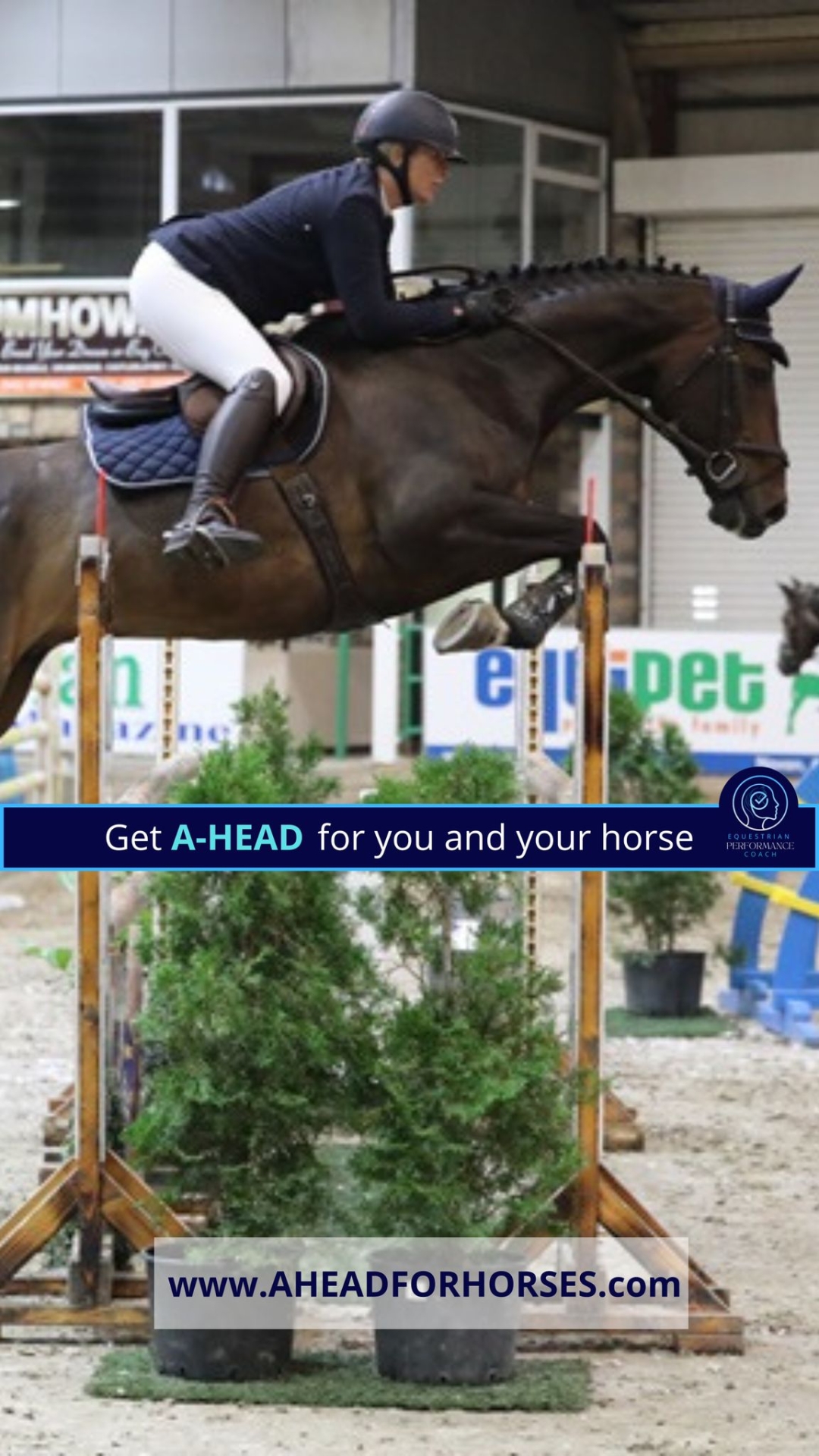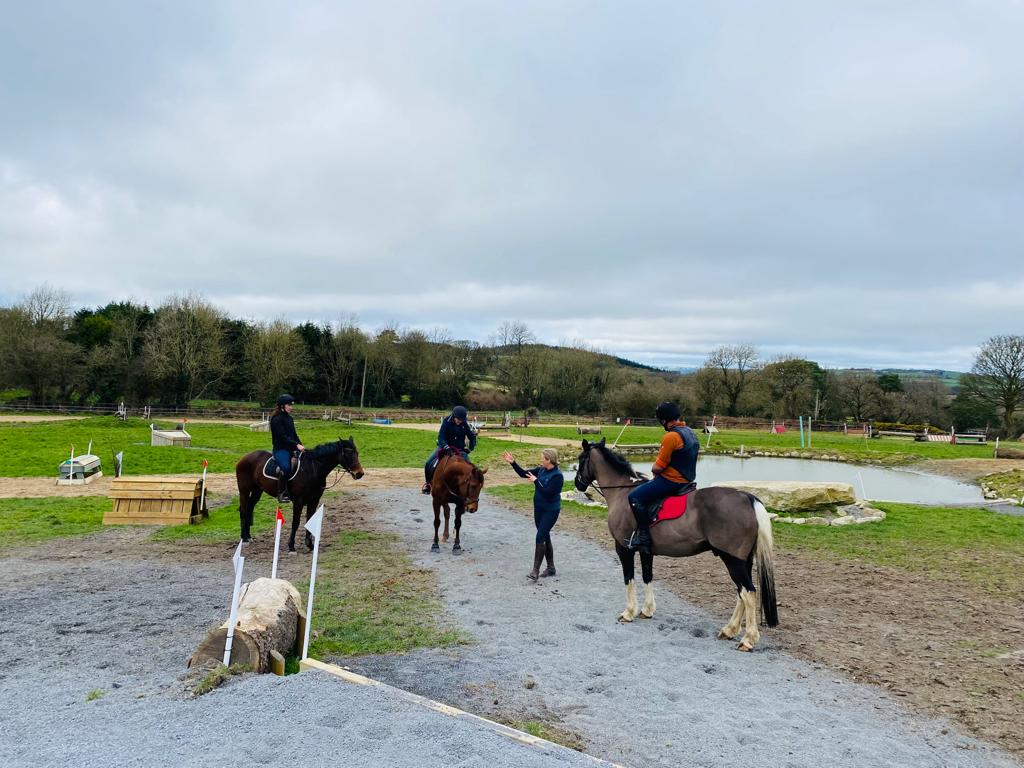
A Day in the Life - Jacqueline Murphy, A Head for Horses
I met Jacqueline Murphy at a horse show and was fascinated about her job as an Equestrian Performance Coach. Horses are her passion and it made sense to her after a major riding accident to marry up the psychology side of things with her time and experience in the saddle.
 Jacqueline Murphy competing at Cavan Equestrian Centre
Jacqueline Murphy competing at Cavan Equestrian Centre
A Head for Horses was set up by Jacqueline, providing sports psychology and mindset for riders. Jacqueline Murphy BSc, MSc, BHSAI, is an accredited Horse Sport Ireland Coach and qualified in management, coaching, psychology, sports and exercise psychology, neurolinguistic programming, and cognitive behavioural therapy.
With a background in the corporate world having worked with major brands she has always enjoyed helping people from all over the world reach their goals in business and in life. Jacqueline has worked all kinds of business from start-ups, family businesses right through to multinationals.
She also works across a wide variety of riders, from those at grass roots level right through to Grand Prix and Olympians.
She has a particular interest in developing the mental toolkit with young riders, skills that help them not just in the saddle, but in all areas of their life.

Jacqueline Murphy coaching young riders at Equipark in Bagenalstown, Co. Carlow
Originally from the UK Jacqueline grew up near Bath, in Somerset. She has been horse mad her whole life having evented to 2 star, ridden in races and is still a competitive amateur show jumper. Her career path started with horse racing, riding out for trainers Paul Nicholls and Karl Burke in university holidays leading to the British Horse Racing Graduate Scheme before later working as a tv presenter for ‘At the Races’, writing a weekly newspaper article and a radio presenter.
Now based in Ireland she lives with her husband, children, horses, and a dog called Rio in Gowran, Co. Kilkenny. Here is a glimpse into Jacqueline’s world…
Why move to Kilkenny?
I met a Kilkenny boy at the Grand National 22 years ago! Little did I think that I would end up in Gowran married with two children.
You broke your back in 2006 after a riding accident. How did the accident happen and lead you to a career change towards psychology?
I was in Newmarket, when the racehorse I was riding jumped over one of the white rails and had a rotational fall on top of me. I thought I was fine, until I tried to stand up and I fell flat on my face.
I was rushed to the spinal unit in Cambridge’s Addenbrooke’s Hospital. There was so much swelling around my spinal cord, so they couldn’t operate until the swelling went down.
As a result, I was strapped to a spinal board for a few days. You get a lot of time to think when you are tied down like that! I didn’t know if I would walk or ride again and when I| questioned my surgeon, he said ‘That depends on you. I have learnt from all the patients that I have worked with that your brain is just as important as your body when it comes to how much recovery you will have.”
I had already attained psychology at A-Level, but after the accident I wanted to learn more about the brain and human behaviour, as well as the excuses that we make to ourselves which stop us achieving our goals.
I went on to keep studying and undertaking a Masters in Applied Sports & Exercise Psychology and the Advanced Applied Psychology for Equestrian Coaches. I am always reading or studying something new!
You work in general sports and within corporate, but horses are your passion. Show jumping can be a lonely sport with a lot of stress on the rider to achieve a minute of perfection in the arena. How do you help young riders with that?
It is often the parents of young riders that first come to me and ask for help, as show jumping for younger riders involves the whole family.
Parents want to engineer better experiences on show days, to avoid tension. Your kids show jump Siobhan, so you get it, kids put a lot of pressure on themselves and are worked up before they even head into the arena.
It’s simple, a by-product of having an enjoyable day is better results. However, it is no good for any competitor if they are in a high state of emotional arousal just before they enter the competition.
Horses are flight animals and if the rider is in a high state of arousal and snapping at mom and dad – the horse will feel that and will respond accordingly, and the rider is much less likely to get the result they want.
They are stopping themselves from doing well, by all the back end of things that happened before you got to a show, i.e., being organised and prepared.
For young riders that’s such a normal way to be, it’s called our neocortex, which is the older part of our brain. The neocortex is about survival, and it decides whether to fight or flee.
The main thing for young athletes to work on is self-talk, self-belief, growth mindset, positive thinking, visualisation, goal setting, preparation, and emotional control. This applies to all sports and in some many areas of life.
How do you apply it across the board to all sports?
People in competition, whether it’s on horseback or a hurling pitch all have desired outcomes for their participation. The skillset of each competitor is different for their respective sport, however failings and approaches used to overcome these failings are often very similar.
For example in recent years the benefits of working with a professional in this area have been well acknowledged by the very successful Limerick hurling team.
Again, a lot of this comes down to our brain. There are 100 billion cells in the human brain with 500 trillion connections, so your brain is a big part of your operating procedure. We are all a product of nature and nurture; you don’t have one without the other.
The brain requires 20% of the oxygen at any time. Some people say, ‘oh that breathing techniques and taking deep breaths is nonsense,’ but if you learn how to breathe properly, everything physiologically is going to happen easier.
Even if we think about it in terms of being a rider, because if your oxygen is getting to your lower leg, your lower leg is going to be on better. If your oxygen is getting to your brain. You're going to make snap decisions faster.
There is no Olympic selection in the world that isn't using sports psychology or doesn't have a sports psychologist for every team. Why do you think it’s so rare here in Ireland?
It’s a little bit like an air vest in riding, everyone knows they're a good idea because they stop you from breaking your bones, but not that many people want to be seen with one yet. It’s a bit the same working on the mental aide of sport.
Whereas I think in 30 years’ time it will be standard procedure that if you're in a show jumping arena, you will be wearing an air jacket, because they prevent things.
So, for me it’s about working with athletes on whatever they want to achieve sometimes that’s working on things that they want to achieve in the saddle but very often with high level riders it’s about working on areas that affect them out of the saddle that allow them to go out on the day and do their best such as relationships, demands of running a business and daily life.
What can we do to help our brains?
1. Exercise regularly. Exercise has many known benefits, and regular physical activity also benefits the brain.
2. Get plenty of sleep. Sleep plays an important role in your brain health. The amount of sleep required to function at your best is different for each person. As any new parent knows, getting enough sleep has a direct influence on how we feel and the decisions that we make each day.
3. Keep hydrated As the brain is made up of so much water dehydration can actually shrink the brain.
4. Stay mentally active. Your brain is similar to a muscle — you need to use it!
Subscribe or register today to discover more from DonegalLive.ie
Buy the e-paper of the Donegal Democrat, Donegal People's Press, Donegal Post and Inish Times here for instant access to Donegal's premier news titles.
Keep up with the latest news from Donegal with our daily newsletter featuring the most important stories of the day delivered to your inbox every evening at 5pm.